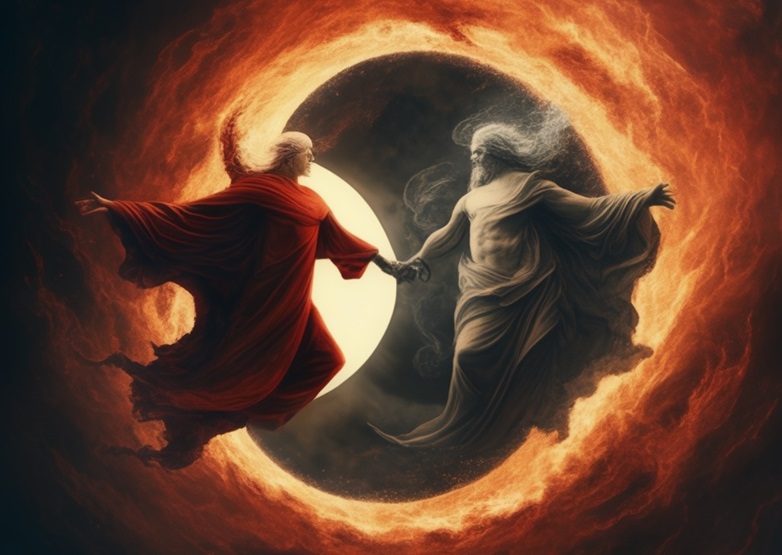Are God and Satan equal and opposite? Does God get credit for good, while we blame the devil for evil? Is God the source of good and evil?

Recently, a friend asked me the following question:
“I’m still kinda on my spiritual journey in trying to be a better Christian but I still got questions in my head that hold me back sometimes. I was wondering if you could help me out with if you had time…I’ve seen and read things like God isn’t really the good guy in the Bible and what if God and the devil are the same entity like a yin and yang. Just random things like that.”
Here’s how I replied:
My Reply
We all have questions, but I hope they won’t hold you back. We get stronger as we wrestle with spiritual perplexities, so it’s a good question. First, let’s look at the spiritual cast of characters in the Bible. Then, we’ll discuss what to do with the discomfort created by these characters. Finally, I’ll address the Yin-Yang principle you mentioned and suggest a solution.
The Cast of Characters
A literalist Christian reading of the Bible reveals a cast of spiritual characters that includes an eternal and uncreated God (Father, Son, Holy Spirit) as the Source of everything else that exists. We can divide the living creatures of the created order into those that are primarily physical (that also possess a spiritual nature), and those that are primarily spiritual (that can sometimes take physical form). The first group includes all living beings in the physical realm, including plants, animals, and human beings.
The second group, often called the heavenly court, includes the vast array of heavenly beings. Traditionalists divide these into two categories. On the one hand are holy angels such as cherubim and seraphim. On the other side are the demons (fallen angels). In this view, Lucifer, (Hebrew: “Light-Bearer”) also known as Satan or the devil, is the chief of rebellious demons. Lucifer is not equal to God, but a fallen angel who will be defeated in the end. So, in this view, Satan is definitely not equal to, or victorious over, God. He is a created being who will fail in his plans.
Zoroastrian Influence
Contrary to most of the sermons you’ve heard, it was a snake, not Satan, who tempted Adam and Eve in the garden. It’s only a Christian reading that assigns the name “Satan” to the serpent. Most Jews do not read the devil into the Eden story. The concept of Satan didn’t fully evolve in Hebrew thought until the Babylonian/Persian exile. Prior to that, ancient Jews feared elemental powers, the gods of other religions, and evil spirits such as Azazel, a spirit that New World Encyclopedia says belonged “to the class of ‘se’irim,’ goat-like demons haunting the desert, to which the Israelites were wont to offer sacrifice.”
At the time of the Babylonian/Persian exile, Judaism came into contact with Zoroastrianism. In this Persian faith, good and evil, dark and light, were near opposites. Zoroaster was never sure which would emerge victorious in the end. Rob MacLachan writes:
Ahura Mazda is the god of Zoroastrianism (from ancient Persia, now Iran.) Zoroaster was one of the first monotheists; his Ahura Mazda was the one true god, bringer of both light and darkness. Ahura Mazda had various personified aspects, and darkness and evil was personified as Angra Mainyu. As Zoroastrianism evolved, Angra Mainyu was elevated to a near-equal of Ahura Mazda, and Zoroastrianism became the most purely dualistic religion…
Before its encounter with Zoroastrianism, Jews saw God as the source of good and evil alike. God brought blessing, but calamity also came from the hand of the Almighty. As it encountered the Persian religion, Judaism became uncomfortable with assigning tragedy to God. So, Satan (Adversary, or Shaitan in Persia) became the scapegoat for all the evils that befall humankind. Unlike Angra Mainyu, Satan was not an equal-opposite, but a fallen angel. To keep God’s hands clean, there needed to be a Satan. Let’s look at a couple of scriptures where Satan does God’s dirty work.
Does Satan Do God’s Dirty Work?
In the Hebrew Bible (Old Testament), Satan and his evil spirits often seem do God’s dirty work. For example, in the book of Job, God and Satan engage in a wager with Job and his hapless family as the pawns, and bragging rights as the stakes. In a literal reading of this story, God does not strike Job with calamity but allows Satan to kill the hero’s children, wipe out his wealth, and attack his health. It appears that the devil himself is a pawn that God uses, simply to prove divine boasts correct.
In another account (1 Kings 22), God convenes the heavenly court to discuss divine plans for war between nations. To foment war, a disinformation campaign is necessary. (Does that sound familiar?) Verses 19-22 say:
Then Micaiah said, “Therefore hear the word of the Lord: I saw the Lord sitting on his throne, with all the host of heaven standing beside him to the right and to the left of him.
And the Lord said, ‘Who will entice Ahab, so that he may go up and fall at Ramoth-gilead?’
Then one said one thing, and another said another, until a certain spirit came forward and stood before the Lord, saying, ‘I will entice him.’
‘How?’ the Lord asked him.
He replied, ‘I will go out and be a lying spirit in the mouth of all his prophets.’
Then the Lord said, ‘You are to entice him, and you shall succeed; go out and do it.’
God seems pleased with this plan, and the evil spirit does his work. In this encounter, it appears that Satan or a demon does God‘s dirty work for him. It’s as if God is too holy to get the divine hands dirty, but the devil is more than happy to oblige.
What to Do with the Discomfort
So, there are indeed scriptures that point to God being a source of evil, while using the devil to conduct painful plans. This makes most of us uncomfortable. We want to view God as a divine Parent who wants only good things for humankind. It’s left to us to determine what to do with the discomfort. I’m sure there are more, but I want to present three options.
1. Blame the Devil
The first option is to say that God is only the source of good, and Satan is only the source of evil. In this view, as James 1:17 says, “Every generous act of giving, with every perfect gift, is from above, coming down from the Father of lights, with whom there is no variation or shadow due to change.” God is the immutable source of all that is beneficial. On the flip side, 1 Peter 5:8b-9a says, “Like a roaring lion your adversary the devil prowls around, looking for someone to devour. Resist him, steadfast in your faith….” Most of Christianity seems to have adopted this view, where God gets the credit for everything good, and we blame the devil for everything bad.
2. “Stuff Happens.”
The second option is to say that God “makes his sun rise on the evil and on the good and sends rain on the righteous and on the unrighteous (Matthew 5:45).” In other words, blessing and calamity happen to everybody. In Luke 13:4, Jesus refers to current events in his community—apparently, a tower in Siloam fell and eighteen people died. Jesus says it wasn’t because these eighteen were worse sinners than everyone else. No—bad things simply happen, the same as good things. This view maintains that God is always and only good, but suggests that God permits evil to happen, just as God permits good.
3. Blame Nobody
The third option is to admit that this cast of biblical characters is a little contrived. It’s a bit like a poorly written movie script with a hero who is all good and the villain is completely evil. This dichotomy of a perpetually good God and an eternally evil devil rings hollow in many people’s ears. Some prefer to see this cast of characters as personifications rather than personages. Others prefer to remove the concept of personality entirely, and simply deal with good and evil as concepts rather than heavenly beings. In this way, they assign neither credit nor blame to God or the devil for the good and evil that happen in the world.
Both Options Have Problems
From a Christian perspective, there are problems with all of these options. The Bible depicts God as a divine personality, and not simply as an impersonal Force. As the Almighty, we might blame God for either causing or permitting evil. Indeed, many people do. If God is a heavenly King, then God either directly causes evil or permits Satan to do evil. Either way, God bears the ultimate responsibility.
Yet, the scriptures also portray God as a holy Force. God is Existence Itself, or the One in whom we live and move and have our being. So, Christianity sees God both as a divine Person as well as a supernatural Force. If God is an impersonal Power, then there’s nobody to credit for good or blame for evil. Yet, this does not satisfy our desire for a relationship with a divine Parent. Most Christians want God to be more than an impersonal Power.
God as an Impeccable Personal Power
For myself, I have satisfied these problems by viewing God as neither a heavenly Person nor as an impersonal Force. For me, God is a personal Power. 1 John 4:16 says, “God is love, and those who abide in love abide in God, and God abides in them.” Love is the Energy that creates, sustains, preserves, and redeems the universe. Love is the ocean in which we swim, the air we breathe, the ground of all being. When good things happen, they happen in impeccable love. When difficult things happen, or when people commit evil deeds, I don’t blame a heavenly Monarch for allowing it. Instead, I know that these things all take place in a field of unimaginable Love.
The Yin-Yang as a Christian Symbol
For me, the Taoist Yin-Yang symbol powerfully represents the swirling relationship between light and dark, masculine and feminine, projective and receptive, hard and soft. It also represents the mysterious relationship between God as Person and God as Power. Each contains a bit of both, constantly swirling. As soon as you think you’ve grasped the essence of this Personal Power, God slips through your fingers again.
What I don’t do is use the Yin-Yang as a symbol of the interplay between good and evil. This Taoist symbol was never meant to represent good and evil, as these are constructs of the dualistic mind. For me, the Yin-Yang represents the fact that God is both Person and Power at the same time, and neither all one nor completely the other.
While Christianity has typically used the cross, the ichthys, the chi-rho, the triquetra, or other symbols of faith, I suggest the Yin-Yang as a Christian symbol as well. If we say that the Trinity represents a divine mystery of three in one, then the Yin-Yang represents the sacred secret of both/and-neither/nor. God is not a divine Person or an impersonal Force. Instead, God is an Impeccable Personal Power that places all good and evil in the context of eternal Love.
Wrestling with God
The Yin-Yang also works as a Christian symbol because it represents the wrestling that we all must do in our quest to understand God. Just as Jacob wrestled with God and emerged with a blessing, so it is with you. It’s healthy to ask questions like this. As I said in my article, “Wrestling with God Builds Spiritual Muscle,”
The fact that Jacob is the only character in the Bible to put God into a full Nelson does not mean he is the only one to wrestle with the Divine. In fact, any Bible story worth telling involves a spiritual wrestling match. Those who developed the most mystical muscle did so by straining against God, testing their limits, deconstructing and then reconstructing their faith.
To the person who asked the original question about God and Satan, and to every reader, I would say this: The questions without solid answers are the best ones. They keep you wrestling, which keeps you healthy. With some issues, you’ll never find the one right answer. You can only find the one that’s right for you. I’ve shared the conclusions that have worked for me—and hope they’ll give you something to consider.
For related reading, check out my other articles:














